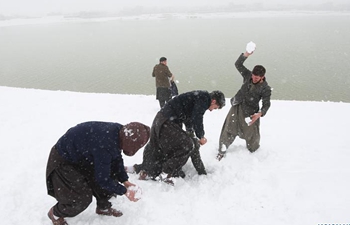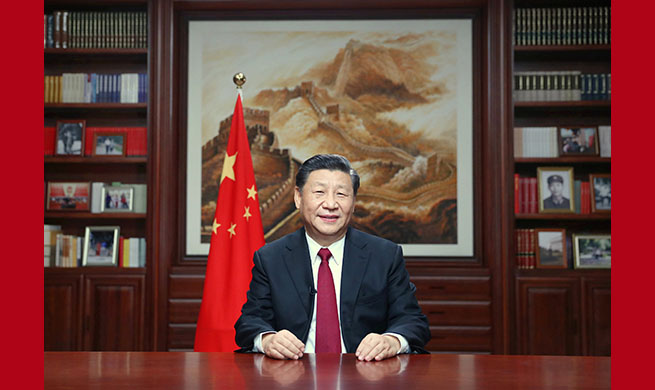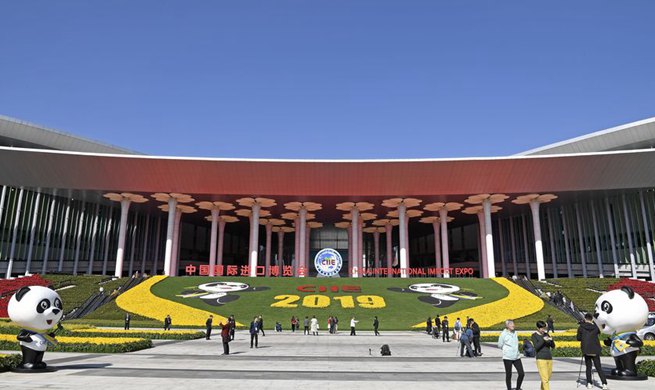ANKARA, Jan. 3 (Xinhua) -- The Turkish parliament on Thursday passed a motion authorizing the government to deploy troops in Libya for a year in support of the United Nations (UN)-backed government based in the capital Tripoli, prompting opposition from some of its regional neighbors.
The Turkish lawmakers voted earlier on Thursday on the motion in an emergency session. It was approved with 325 votes in favor and 184 against.
The motion said sending troops to Libya aims to prevent the "illegitimate mass migration threat and formation of a favorable environment for terrorist organizations and armed groups."
Libya has been locked in a civil war that escalated in 2014, splitting power between two rival governments: the UN-backed Government of National Accord (GNA) based in the capital Tripoli and another in the northeastern city of Tobruk which is allied with the self-proclaimed Libyan National Army (LNA) led by Khalifa Haftar.
Regional countries including Egypt, the United Arab Emirates, and Saudi Arabia support Haftar's LNA, while the GNA is backed by Turkey and Qatar.
Turkey has found the GNA a valuable ally in the region, as the latter recognized Turkey's territorial claims in the eastern Mediterranean, where Greece and Cyprus want to build a pipeline to carry natural gas to Europe.
In response to Turkey's approval on Thursday, Egypt's Foreign Ministry said in a statement that Egypt "warns against the consequences and repercussions of any Turkish military intervention in Libya."
"Such an intervention would negatively affect the stability of the Mediterranean region and Turkey would bear full responsibility for that," it added.
The Cairo-based Arab League (AL) said on the same day that it considered the move a "promotion of the ongoing conflict" in Libya.
"The AL Council stresses support for the political process in Libya," the AL said, adding it considers a 2015 UN-brokered peace deal between Libya's warring factions, reached in Morocco's Skhirat city, as "the only reference for settlement in Libya."
The approval "marks a dangerous escalation of the conflict and a significant deterioration of the situation. Turkey should not violate the Libyan Political Agreement and related United Nations resolutions," said a joint statement made in Athens by Greek Prime Minister Kyriakos Mitsotakis, Cypriot President Nicos Anastasiades and Israeli Prime Minister Benjamin Netanyahu.
Thursday's approval came over a month after Turkey sealed a controversial maritime boundary delimitation agreement with the GNA along with a security cooperation deal, to extend maritime zones for Turkish energy explorations and block further Greek and Cypriot energy drilling activities in the Mediterranean.
The agreement was praised as a "historic step" by the Turkish press and experts, but it angered regional neighbors, inflaming tensions in the eastern Mediterranean over energy resources.
To some Turkish experts, both the agreement and Thursday's approval were a bid to break Turkey's isolation in the eastern Mediterranean and protect its interests.
The military mission has become essential to Turkey's national interests and it will address the long-term objectives regarding Turkey's role in the Mediterranean, said Serkan Demirtas, a Turkish political analyst.
"Turkey has been isolated by its main regional adversaries Greece, Egypt and Israel, thus Ankara needs new allies in the region. That's why it signed maritime boundary delimitation and security deals with Libya to break off this isolation," said Oytun Orhan, coordinator at the Ankara-based Center for Middle Eastern Strategic Studies..
The GNA is one of the few regional actors that back Turkey's vital interests in the eastern Mediterranean, and Turkey is keen to safeguard the deals between the two sides, he added.













